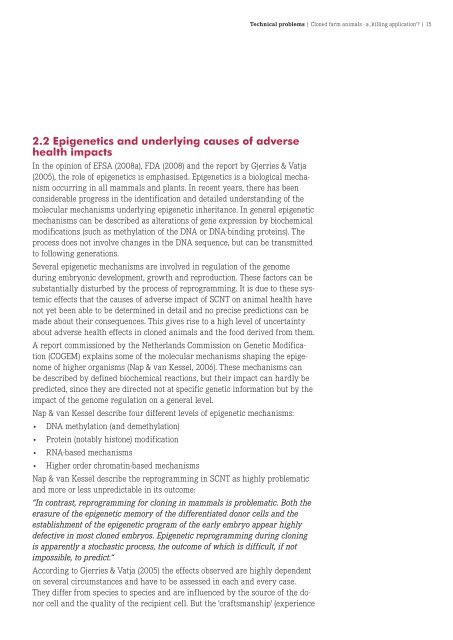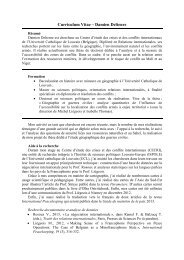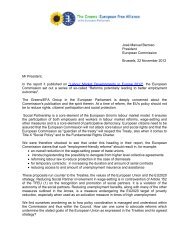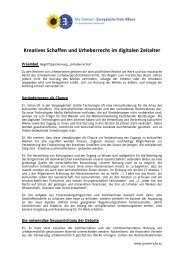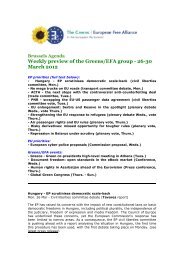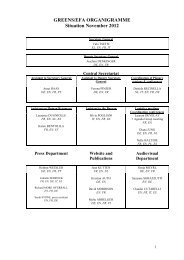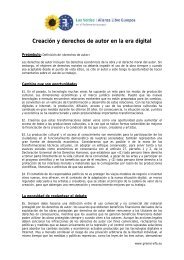Agro-Biotechnology: - The Greens | European Free Alliance
Agro-Biotechnology: - The Greens | European Free Alliance
Agro-Biotechnology: - The Greens | European Free Alliance
You also want an ePaper? Increase the reach of your titles
YUMPU automatically turns print PDFs into web optimized ePapers that Google loves.
Technical problems | Cloned farm animals - a ‚killing application‘? | 15<br />
2.2 Epigenetics and underlying causes of adverse<br />
health impacts<br />
In the opinion of EFSA (2008a), FDA (2008) and the report by Gjerries & Vatja<br />
(2005), the role of epigenetics is emphasised. Epigenetics is a biological mechanism<br />
occurring in all mammals and plants. In recent years, there has been<br />
considerable progress in the identification and detailed understanding of the<br />
molecular mechanisms underlying epigenetic inheritance. In general epigenetic<br />
mechanisms can be described as alterations of gene expression by biochemical<br />
modifications (such as methylation of the DNA or DNA-binding proteins). <strong>The</strong><br />
process does not involve changes in the DNA sequence, but can be transmitted<br />
to following generations.<br />
Several epigenetic mechanisms are involved in regulation of the genome<br />
during embryonic development, growth and reproduction. <strong>The</strong>se factors can be<br />
substantially disturbed by the process of reprogramming. It is due to these systemic<br />
effects that the causes of adverse impact of SCNT on animal health have<br />
not yet been able to be determined in detail and no precise predictions can be<br />
made about their consequences. This gives rise to a high level of uncertainty<br />
about adverse health effects in cloned animals and the food derived from them.<br />
A report commissioned by the Netherlands Commission on Genetic Modification<br />
(COGEM) explains some of the molecular mechanisms shaping the epigenome<br />
of higher organisms (Nap & van Kessel, 2006). <strong>The</strong>se mechanisms can<br />
be described by defined biochemical reactions, but their impact can hardly be<br />
predicted, since they are directed not at specific genetic information but by the<br />
impact of the genome regulation on a general level.<br />
Nap & van Kessel describe four different levels of epigenetic mechanisms:<br />
• DNA methylation (and demethylation)<br />
• Protein (notably histone) modification<br />
• RNA-based mechanisms<br />
• Higher order chromatin-based mechanisms<br />
Nap & van Kessel describe the reprogramming in SCNT as highly problematic<br />
and more or less unpredictable in its outcome:<br />
“In contrast, reprogramming for cloning in mammals is problematic. Both the<br />
erasure of the epigenetic memory of the differentiated donor cells and the<br />
establishment of the epigenetic program of the early embryo appear highly<br />
defective in most cloned embryos. Epigenetic reprogramming during cloning<br />
is apparently a stochastic process, the outcome of which is difficult, if not<br />
impossible, to predict.“<br />
According to Gjerries & Vatja (2005) the effects observed are highly dependent<br />
on several circumstances and have to be assessed in each and every case.<br />
<strong>The</strong>y differ from species to species and are influenced by the source of the donor<br />
cell and the quality of the recipient cell. But the 'craftsmanship' (experience


